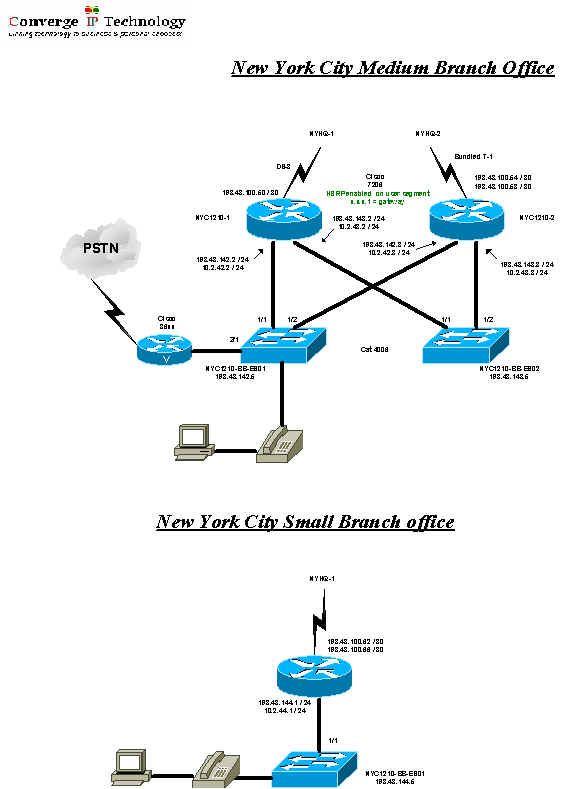-
200
users will be supported in Medium branch by the Headquarters (HQ) cluster.
-
G.711
encoding will be used.
-
Total
voice bandwidth required for 80 simultaneous users
= 80*80Kbps= 6.4Mbps
-
These
users will utilize both the Hoteling and Voicemail applications deployed at HQ.
-
1111
6th Ave will be connected to HQ via (2) 7206 routers
connected to dual 6509s with Flexwans via a primary DS3 line and a set of (4)
T1s for backup. It should be noted that in the case of a DS3 failure, G.729
encoding must be manually configured for the IP phones at the remote site due
the reduced bandwidth available. Transcoding resources would also need to be
manually configured so that these users can access voicemail and gateway
resources.
-
The
(4) T1s will be divided into two MLPPP groups, one for voice and one for data.
(2) T1s will be used to serve only voice traffic, and (2) T1s will be used to
serve only data traffic. Data and voice traffic will be forced over the
appropriate MLPPP group by utilizing route filters, since voice and data will be
on different subnets. No QOS is required on these links given that voice and
data are no longer contending for the same limited WAN bandwidth. When MLPPP and
LLQ are supported on the Flexwan, the need to partition voice and data into two
MLPPP groups will be eliminated, and a more efficient use of the WAN bandwidth
will be possible.
-
No
Call Admission Control is being configured given 45Mbps of available WAN
bandwidth.
-
Call
Admission Control will be configured for the backup scenario, when voice is
traversing the (2) T1 voice MLPPP group.
-
LLQ
will be implemented on the DS3 links to insure voice priority over data. CBWFQ
will be used for the video traffic.
-
Dual
routers running HSRP will be used at each location for redundancy.
-
Separate
VLANs for voice and data will be deployed.
-
The
7206 routers will be used for inter-VLAN routing.
-
A
single VG248 will be deployed at each site to terminate Fax and modem
lines.
-
Survivable
Remote Site Telephony (SRST) will be deployed on the 7206 router. SRST on the
7206 NPE 400 has the ability to support a maximum of 500 phones with 512MB of
SRAM and 300 phones with 256MB of SRAM.
-
A
3662 router will be deployed at 1111 6th Ave to terminate 10 FXO ports. This
router will act as a gateway for 911 calls to insure the appropriate location
information is relayed to 911. It will also serve as a PSTN gateway in the event
of a WAN facility failure, and connectivity to the CallManager in NY Hub (HQ) is lost. With SRST deployed on the 7206, the ability to make calls will be
maintained. The FXO circuits may also be terminated on a Power Failure Transfer
system to analog handsets. This would provide dial out capability in the case of
the WAN being unavailable or a 3600 gateway failure.

